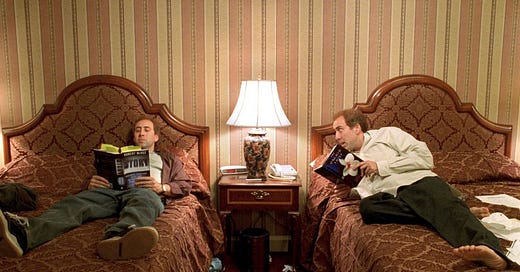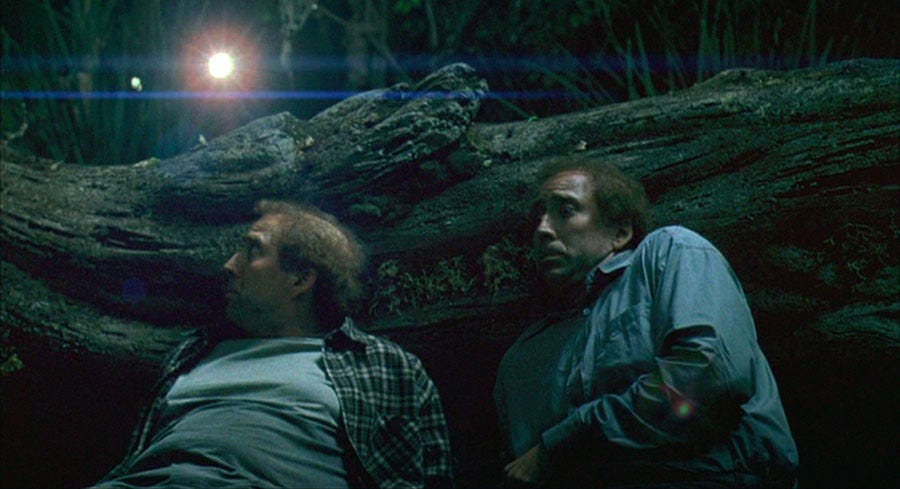Adaptation.: musings
"You are what you love, not what loves you."
When real-life Kaufman arrives at the third act of his screenplay, he's at a crossroads. He doesn't know how to end this adaptation that's already veered way off-course. At some point, he inserted himself into what should be an innocuous meditation of nature and life, and he characterised himself as the worst version of all of his neuroses manifest. The central struggle of the entire film is the identity of his creativity, and how that clashes with the mechanisms of an artform so tethered to rules - guidebooks that dictate how the art should present, as well as a wider business that dictates how the art should be commercially viable - but Charlie Kaufman is not a normal writer.
What's so engaging about this film is that we're watching perhaps the only cinematic rendition of stream-of-consciousness writing. This truly feels like a film that's a sequence of sporadic post-it notes on Kaufman's wall, strung together and constantly re-arranged as the runtime plays out. It's a deck of cards constantly being shuffled. Just like in Charlie's central tension around anchoring his film, we as the audience are untethered too, never quite knowing where we're going next or what's even happening. Real-life Charlie Kaufman depicts himself as fat, lazy, jittering with anxiety and dripping with pathetic sweat. He then invents a twin brother who is the complete opposite - charming, effortlessly successful, endearing and enigmatic.
Throughout the film, Charlie hates Donald, and constantly derides everything he does. There's a tinge of envy that burgeons out of Charlie in these moments: he knows his brother is doing everything he wishes he could do, so must strip him of any respect, but his brother refuses to yield - or as Charlie puts it, he remains oblivious - and this only serves to disarm Charlie further. Donald makes friends with all the people Charlie wishes he could befriend, he follows all the rules of screenwriting that Charlie wants so desperately to deconstruct, and everything he does works out for him. Charlie's own hope is in his perception of his own genius - in a telling sexual fantasy, his muse-of-the-day reads lines from his script whislt declaring him a genius repeatedly, then fucks his brains out. Charlie knows that he doesn't have any of the traits of his brother, but if he can just persist with following his brain's creativity, then he can come out on top. Except that pursuit is fruitless, sends him down a rabbit hole with no end, and leaves him stagnant.
As soon as Charlie invites Donald into his life, everything changes. The entire third act shifts. Both Susan and John are suddenly compeletely different people, bereft with drug abuse, violence and affairs. The film itself adapts, like in nature, into the very thing Charlie sworn against: salacious sex, plot twists and every trope of a thriller. Donald has taken over the script. But here, despite the chaos of the plot unravelling around them, we find the true ending. Charlie and Donald, hiding from their aggressors, have a truly heartfelt moment. Charlie confesses that he idolises Donald and his obliviousness, and intends it as a compliment. He brings up a specific example: in school, Charlie observed Donald flirting with a girl whom promptly mocked him when he turned his back. Charlie commended Donald for this, he saw that Donald was blissfully unaware of the consequent mockery and walked away feeling happy that he had flirted. But Donald quickly corrects him - he knew, but it didn't matter. The girl's feelings about Donald were irrelevant, because they're out of his control - it's only Donald's feelings that are relevant to Charlie.
In this moment, everything changes for Charlie. Charlie's entire life has been built around this shakey sense of diction about his identity. It's been heralded in the shadows of his brother - a twin he perceives as both better and worse than him in every way. Yet it was all built on misperception. Charlie needed Donald to be blissfully unaware of his failures, because then Charlie could feel better about his own. If Charlie is too smart not to be aware, then that is his Achille's heel, and his greatest strength. It is not his fault for anything that happens in his life, or any of his feeligns or reactions - he wishes he could be blissfully unaware like Donald, but he can't, and so he has to accept the card he is dealt. But in this moment, he realises that Donald is aware of his shortcomings, but he found a way to cope with them, and to not let them affect his self-esteem. Donald didn't make excuses to stay stagnant, he allowed himself to adapt, just like the primordial beings that became the flowers we chase today.
And that's why Donald had to die. Real-life Charlie created a fictional idealised version of himself to contrast himself against, to highlight his own shortcomings, but through the process of writing this screenplay, he realised that the only thing getting in his own way was himself. Donald had to die now, because Donald was the roadblock in his mind all along. He doesn't need to be Donald, and if he projects this idealised version of himself outward, then he never needs to try. Once Donald is gone, Charlie is forced to find ways to build himself to the version of himself he wants to be. In fact, using terms like "version of himself" is reductive and redundant, because there are no versions of us, except who we are right now. Charlie, by finishing this screenplay, driving off into the sunset, and listening to The Turtles, found his adaptation.
It really is a wonderful film. I used to love this film as a teenager, then decided to hate it because I wanted to be contrarian, and then I didn't watch it again for fifteen years until tonight. We all build roadblocks in our minds. Some roadblocks stop us from accessing ourselves. Others stop us from accessing other people. But as John so succinctly says, "the only barometer you have is your heart."





